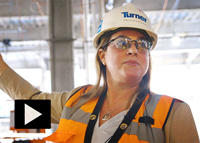After more than two decades with the organization, Lou Coletti is stepping down as president of the Building Trades Employers Association.
He will be replaced by Elizabeth Crowley, a former City Council member and union painter. She will be the first woman to lead the construction contractors group.
Crowley said one of her priorities is to ramp up union-led construction in the city. She said construction unions have seen their market share slip on affordable housing projects.
“Our government leaders are aligned on the need for affordable housing,” she said. “The problem is, at the same time, so much of that is going to nonunion workers.”
BTEA represents contractors who mostly use union labor. One of its tasks is to work with construction unions to keep their costs competitive. Cost is the primary reason affordable housing projects, which have thin margins, tend to be built nonunion.
Crowley, who lost a bid for state Senate in Queens to a socialist last year, said city and state governments can find creative ways to stem rising construction costs. She pointed to the redevelopment of JFK Airport, where insurance costs were reduced through an alternative dispute resolution process.
Individual unions, including the carpenters and laborers, have cut wages and other costs by shifting the ratio of workers on jobs in favor of those with lower pay grades. The laborers have reached such agreements in order to secure work on affordable housing projects.
Coletti saw several major industry shifts during his tenure at BTEA, which began in 1997. One was an increase in general contractors using a mix of union and nonunion labor — referred to as open shop — on projects that had previously been the sole domain of union workers.
The group’s members include 1,200 general contractors and specialty trade subcontractor firms. Coletti described his organization’s role as one leg of a three-legged stool, the others being the Building and Construction Trades Council and the Real Estate Board of New York.
The groups are often aligned on issues and helped shape the city’s response to crises, including the shutdown of construction sites during the pandemic. The rise of nonunion labor in the city, however, has led to tension among the stool legs over the years.
Though the BTEA’s members largely employ union labor, they also hire nonunion firms. The BTEA was formed in 1903, according to its website, to serve as referee among the city’s construction unions. Coletti said the group has always been dedicated to getting 100 percent union labor on construction projects, but it has also been realistic about its members’ need for flexibility.
“You have to also be realistic and address the market conditions to ensure your company continues to be successful,” he said, alluding to hiring a mix of union and nonunion firms.
In its search for Coletti’s replacement, the BTEA’s board agreed the organization needed to be known as “the advocate for the union contractor and construction industry,” Coletti said.
Brian Sampson, president of the New York chapter of the Associated Builders and Contractors, a group that represents open-shop firms, said he is looking forward to working with Crowley. He said that although there are some issues they will never see eye-to-eye on, he hopes they can work together on policies where their interests align.
Crowley’s role will require some balancing between the interests of her members and those of construction workers, Sampson said.
“There’s a fundamental difference between being an advocate for a worker and being an advocate for the contractor,” he said. “Those interests don’t always align.”
Crowley is a longtime union advocate, having begun her career as a union painter with District Council 9. Her failed run for Senate last year was backed by construction unions and other organized labor groups.
During that run and another for Queens borough president, she pledged to reject money from real estate developers, though that did not stop real estate groups from aiding her Senate campaign, according to The City.
As a Council member, Crowley co-chaired the chamber’s Women’s Caucus, now known as the New Majority. She pointed to her experience helping to usher in the first Council majority of women and women of color, and said she would work to bring more women into the building trades.
Coletti will leave his post next month, Crain’s was the first to report. He plans to start a consulting firm, Lou Coletti Strategies, focused on, among other things, helping New York adopt new construction technology.
“It is time for New York to join the rest of the world,” he said.
Read more


